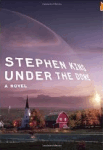Under the Dome
Stephen King
Scribner
Hardcover, 1088 pages, $35.00
Review by Sheila Merritt
What happens when Stephen King, the 800-pound gorilla of horror, writes an over one thousand page novel? It works: He validates his weight; and even throws it around, a little. King is long beyond the stage of pay by the word, and is in the enviable position of being able to mostly indulge his loquacity; which he does in Under the Dome. It is staggering, therefore, to read in the author’s note that the book was originally quite a bit longer. He credits his editor Nan Graham for making the novel “a beast of slightly more manageable size.”
Falling back on certain tried and true motifs he used to great success in other works, King skillfully tailors them to specifically fit in Under the Dome. He also exhibits his own unique, indeed peculiar, gift for precisely striking a nerve and deftly turning a screw.
The basics of the plot: Chester’s Mill, a small town in Maine, is suddenly encompassed by an invisible force field; it is lethally impenetrable and physically separates the community from the rest of the world. Air quality is on the decline, and resources are diminishing. The local government seizes control, since any authority from outside the dome cannot be enforced.
Big Jim Rennie, a corrupt local politician, plays on the fears and frustrations of the townspeople and sows seeds of dissention. He maintains power by manipulation of emotion and strangulation of free speech. Opposing Big Jim and his minions are representatives of King’s constant cadre of characters: The bright nerdy youths; the dissidents; the disenfranchised; the observant; those who question. Rennie commits murder and other heinous acts to keep his hold on the town, yet justifies them with religious fervor; a recurring thread in King’s body of work.
If religion is, like Karl Marx surmised, the opiate of the masses, then Big Jim is a dealer and a junkie. He sees himself as having a divine destiny, but never loses sight of his passion for power. In his eyes “Wealth was the short beer of existence. Power was the champagne.” The demented damage that Big Jim does is the focus of the book. Like a deranged puppet master, he orchestrates mayhem; getting his perverse jollies from the revolting results. The reason for the dome’s existence takes backstage to his autocratic antics and their aftermath.
The book is largely a moral parable, but the author does have fun in the telling. His omniscient narrator talks to the readers; making them voyeuristic, intellectually engaged accomplices in the action. They become watchers from a distance, which is a sly subliminal hint about the source of the dome. By employing a literary device, the lifting of a passage from a T.S. Eliot poem, King further plays on the complicity element: “Let us go then, you and I…”
Folks with foibles populate Chester’s Mill, and as the number of townspeople inevitably dwindles, the tension tightens. When it looks as though things can’t get any worse, they do. King plays his hand expertly; dishing out the emotional blows with perfect timing. He highlights his characters’ personal imperfections so that their motivations and responses are completely comprehensible; even if not always admirable.
“When dawn was still hours away, bad thoughts took on flesh and began to walk. In the middle of the night thoughts become zombies.” Stephen King does have a way with words. In Under the Dome, he reasserts his command of them; and they are many. The hefty book is cumbersome to tote; carrying it in hand creates a sensation not unlike tennis elbow, and keeping it propped up on the lap is a fatiguing chore. It is also weighty in theme; few authors could bring it off without sounding preachy. King is laudably restrained in his didacticism. Stephen King’s strengths as a writer are well served in this novel; and having a fine editor obviously didn’t hurt, either.









